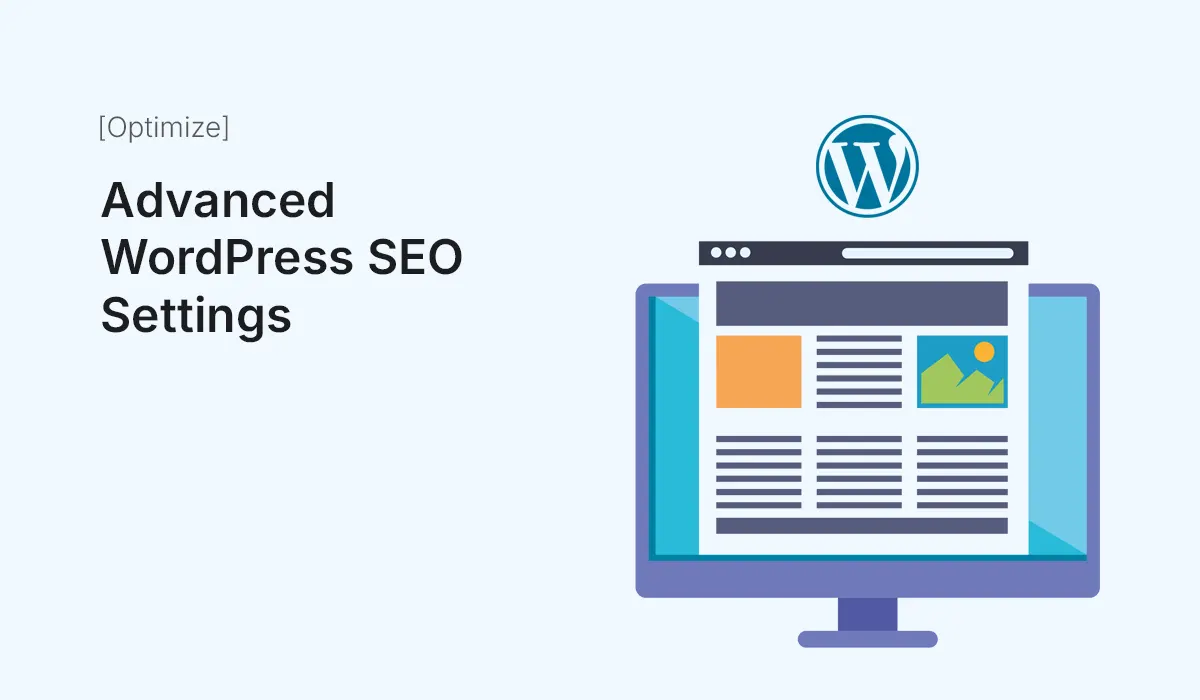Getting traffic to your WordPress website requires more than just publishing great content. Search engine optimization (SEO) is essential for ranking high in search results and driving organic visitors. While beginner SEO guides cover the basics like keywords and meta descriptions, in this post, we’ll dive into advanced WordPress SEO settings that can give your site a real competitive edge.
Why Advanced SEO Matters in WordPress
- Competition is High – Millions of WordPress sites are published every year, so basic SEO isn’t enough.
- Better Rankings – Advanced settings ensure your site is fully optimized for search engines.
- Technical Foundation – Solid technical SEO improves crawlability, indexing, and performance.
- User Experience – Advanced optimizations often overlap with better usability and speed.
Optimize Permalink Structure
WordPress lets you set custom permalink structures. For SEO, clean URLs are important.
Go to: Settings > Permalinks
- Choose Post name (
/sample-post/). - Avoid long or unnecessary parameters (like
?p=123). - Use keywords in URLs, but keep them short.
Example:yourwebsite.com/advanced-wordpress-seo-settings
Use an Advanced SEO Plugin
Beginner plugins like Yoast SEO or Rank Math cover basic optimizations, but you can unlock advanced features by tweaking settings.
Recommended Plugins:
- Rank Math SEO – Best for advanced schema, 404 monitoring, and redirection.
- Yoast SEO Premium – Strong internal linking and content insights.
- All in One SEO (AIOSEO) – Great for WooCommerce SEO.
Must-Enable Settings:
- XML sitemaps
- Schema markup
- Canonical URLs
- Redirect manager
- 404 error monitoring
Advanced XML Sitemap Configuration
Search engines use sitemaps to discover your content.
- Ensure only important pages are included.
- Exclude thin content like tags, author archives, or unnecessary custom post types.
- Submit sitemap directly to Google Search Console and Bing Webmaster Tools.
Control Indexing with Robots.txt
Your robots.txt file guides search engines on which parts of your site to crawl.
Example:
User-agent: *
Disallow: /wp-admin/
Disallow: /wp-includes/
Allow: /wp-admin/admin-ajax.php
Sitemap: https://yourwebsite.com/sitemap_index.xml
- Block duplicate or irrelevant pages.
- Always allow access to critical files (CSS, JS).
Use Canonical URLs
Duplicate content can confuse search engines. Canonical tags tell Google which version of a page to rank.
Most SEO plugins automatically add rel=“canonical” tags. Check your source code to confirm.
Advanced Schema Markup (Structured Data)
Schema helps search engines understand your content.
Examples of schema types:
- Article (for blogs and news)
- Product (for WooCommerce stores)
- Recipe (for food blogs)
- Event (for conferences and workshops)
Tools:
- Rank Math & Yoast SEO add schema automatically.
- Use Schema Pro plugin for complex websites.
Validate schema using Google’s Rich Results Test.
Optimize for Core Web Vitals
Google uses Core Web Vitals as a ranking factor.
Key metrics:
- Largest Contentful Paint (LCP): Aim <2.5s
- First Input Delay (FID): Aim <100ms
- Cumulative Layout Shift (CLS): Aim <0.1
How to Improve:
- Use a fast theme (Astra, GeneratePress).
- Enable caching (WP Rocket, W3 Total Cache).
- Use a CDN (Cloudflare, BunnyCDN).
- Compress images (ShortPixel, Imagify).
Optimize Mobile SEO
Most searches happen on mobile.
- Use a responsive theme.
- Test mobile performance in Google PageSpeed Insights.
- Ensure mobile navigation is simple.
- Avoid intrusive popups that block content.
Advanced Internal Linking Strategies
- Use contextual internal links to related posts.
- Add breadcrumb navigation for better indexing.
- Use plugins like Link Whisper for automated suggestions.
Pro Tip: Keep key pages within 3 clicks from the homepage.
Manage Redirects Properly
When you delete or move pages, set up 301 redirects to preserve link equity.
Plugins:
- Rank Math Redirect Manager
- Redirection Plugin
Avoid redirect chains (multiple hops).
Optimize WooCommerce SEO
If you run an online store:
- Optimize product titles with long-tail keywords.
- Add structured product data (price, availability, reviews).
- Create unique product descriptions (avoid duplicate manufacturer text).
- Optimize category pages for higher rankings.
Secure Your WordPress Site
Google considers site security in rankings.
- Install SSL (HTTPS).
- Use a security plugin (Wordfence, iThemes Security).
- Block spam with Akismet or Antispam Bee.
- Enable 2FA for admin accounts.
Advanced Image SEO
- Use descriptive file names (
blue-running-shoes.jpg). - Add alt text with target keywords.
- Generate WebP versions of images.
- Lazy load images for faster performance.
Leverage Content Delivery Networks (CDN)
A CDN caches your site across global servers, reducing latency.
Popular CDNs:
- Cloudflare (Free + Paid)
- BunnyCDN
- KeyCDN
Monitor SEO with Analytics & Tools
- Google Analytics 4 (GA4): Track visitor behavior.
- Google Search Console: Monitor indexing and performance.
- Ahrefs / SEMrush: Advanced keyword research and backlink analysis.
- Screaming Frog: Technical SEO audits.
Optimize for International SEO (If Applicable)
If targeting multiple regions:
- Use hreflang tags to define languages.
- Create region-specific sitemaps.
- Use separate domains or subfolders (
example.com/us/,example.com/uk/).
Advanced SEO for Blogs
- Add Table of Contents for long articles.
- Enable last updated date for freshness.
- Use FAQ schema for common questions.
- Include author bios for trustworthiness (E-E-A-T).
Conclusion
Mastering advanced WordPress SEO settings can transform your site’s performance in search rankings. From technical foundations like robots.txt, schema, and Core Web Vitals to content strategies like internal linking and WooCommerce optimization, each setting helps build a site that’s not only search engine-friendly but also user-friendly.
Remember, SEO is not a one-time setup. Regular audits, updates, and optimization are key to staying ahead of competitors.
Boost your visibility today — start applying these advanced WordPress SEO settings and take your website to the next level in search rankings!






